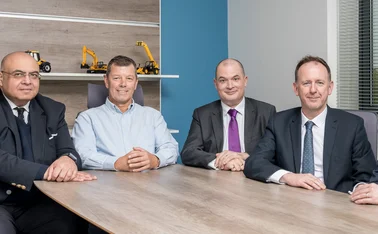
Norwegian insurtech start-up plots London base and funding round

Need to know
- Cloud Insurance has deliberately targeted UK and US due to size of markets
- Put off seeking funding until it had a scalable and sane business case
- The start-up claims the quality of its recruits is testimony to attraction of insurtech
Norwegian insurtech start-up Cloud Insurance is looking to establish an office in London in 2019 as it prepares for a funding round to help it grow the business.
The software-as-a-service provider already counts the likes of Scandinavian insurance company Vardia and US healthcare provider Compass Benefits Group as customers, and it is now looking to bolster its UK client base.
CEO and co-founder Axel Sjøstedt, pictured right, told Post: “The [Cloud Insurance] journey started when my co-founder [Håvard Landrø Nilsen] and I were studying business together. But as IT geeks at heart we started doing some projects on the side, including one for a Norwegian insurance company, which was digitalising its claims process
“At that point we had a lightbulb moment and thought, if this is the way people are working in this industry then there had to be potential to help others through the digitalisation journey and the idea to begin Cloud Insurance was born.”
Working with subsequent clients, Sjøstedt said it now has a “robust product that it is taking out to UK clients”. He continued: “From a commercial perspective we are based in Scandinavia and have some clients there. But since these markets are quite small - as with most Scandinavian start-ups – we started to look to scale up globally early on. And so today most of our clients are in the USA and UK, and these are our two primary markets.”
SaaS With A Modern Twist
Sjøstedt describes its SaaS offering as a “core insurance system, but with a modern twist”, with features covering everything from claims to policy administration; compliance to customer insights.
VP of commercial operations Kirsten Jarneid added: “It is important for us to provide real business value for our customers, and we get a lot of feedback that we have helped clients increase revenue and reduce costs. Another factor we have found really useful is the ease with which we can help deliver new products, both traditional and increasingly, ones that are more disruptive. Really cutting down that speed-to-market.”
Among the areas it has already worked are travel, affinity and simple health; but Sjøstedt is keen to explain how adaptable its solutions can be.
“When you look at insurance the market is very fragmented in terms of products, and so we have picked ones in the value chain that we think are a good fit. Niche players make good clients for us, but that said, the product itself is very flexible.
“And we have worked with different players in different ways, so even though we are strong in the intermediary and SME space, we also have success stories working with larger incumbents; and when we do that we act more as innovation enablers rather than providing the full stack solution we can offer smaller companies.”
To date Cloud Insurance has not invested much in the way of marketing, or needed to raise money to entice business, as it has come to it through word-of-mouth.
Clients Knocking On Its Door
Sjøstedt explains: “All of the clients that have come to us have knocked on our door, which is a great position to be in and the result of us having a good product and insurance being so inter-connected and global; there are not many links before you are on the East coast of the US from Norway, which is fascinating.
“We have a lot of happy customers who have referred us to other customers. But we are at the point now where we are focusing more on marketing and sales so we in discussion to increase our presence in London.”
To date the business has self-funded its own growth and in 2017 it made $170,000 of profit on revenues of $750,000. “So in the coming ten to 14 months the plan is to raise a round, and scale up the sales and marketing activities, Sjøstedt added.
Asked whether he has any concerns that doing the investor rounds might prove a distraction from the core business, he responds: “Yes, that is one of the main reasons that up to now we have focused on building a scalable and sane business case. Because it has made it easier to focus on what is important for the company, rather that [priortising] landing a round.”
“But it is about not waiting until you really need the money. But having a plan to prepare for the moment you will need the funds. To look to the future,” Jarneid added.
“So we are in discussion with some potential clients [in London] and we will continue those, but we also need to understand how we should spend our time best in terms of our sales and marketing efforts. But it is safe to say that we plan to have a physical presence in terms of opening an office in 2019 in London.”
Presently Sjøstedt and Jarneid are visiting London once a month, and could scale that up in the short term if necessary to meet initial demand.
Incumbents Adopting Pay-It-Forward Attitude
“I am extremely positive after our recent visits and impressed by the openness and fact people are looking forward,” Sjøstedt explained. “In the start-up world that is a given, but the incumbents are also adopting a ‘pay-it-forward’ Silicone Valley-type view, and realising the digital wheels are running faster and faster. And the only way you can counter this threat is to embrace the opportunity and be open to change. And I get the impression that this industry is happy to do that. And we are not coming here just with a proof of concept, but a real solution.”
Cloud presently has 13 members of staff, including four summer interns, roles for which there was significant competition.
“We were overwhelmed by the number of applicants and we now have four really good students who are studying artificial intelligence and are doing some cool projects this summer,” Sjøstedt continues.
“And the amount of applications and the competencies that these engineering students bring is a sign of how this insurtech wave is drawing talented people into this space.
“Talk about having access to large companies and funding is all very well and good, but if we can agree on the cliché that the having the best people is the most important factor then you have to say insurtech is working. Because if you take not only the students, but the other people we have hired, five years ago they would never have considered joining an insurtech start-up as natural career move.”
Asked what the future holds for Cloud Insurance outside a London office and capital raising, Sjøstedt, concludes: “We don’t want to be another core insurance system provider, but provide innovation capacity for our clients so that they can develop different products that they can distribute in different ways.
“And some of the things we can add to achieve that include strengthening our machine learning offering, where we have done some work to date; but also moving into AI and looking into ways you can apply it to parts of the process. APIs are becoming more important too, especially for the larger the clients, that believe they can help them do the heavy lifting.”
Sjøstedt also sees a lot of potential in the use of behaviourial data to offer more dynamic pricing, adding that it is doing one proof of concept with a firm in the US around personalization.
“And it is about time, because over the last 100 years the insurance industry has practically offered the same products,” he concludes. “And part of the problem is that they are constrained by the structure around them including their IT, so it is about time it become an enabler, rather than holding them back.”
Only users who have a paid subscription or are part of a corporate subscription are able to print or copy content.
To access these options, along with all other subscription benefits, please contact info@postonline.co.uk or view our subscription options here: http://subscriptions.postonline.co.uk/subscribe
You are currently unable to print this content. Please contact info@postonline.co.uk to find out more.
You are currently unable to copy this content. Please contact info@postonline.co.uk to find out more.
Copyright Infopro Digital Limited. All rights reserved.
You may share this content using our article tools. Printing this content is for the sole use of the Authorised User (named subscriber), as outlined in our terms and conditions - https://www.infopro-insight.com/terms-conditions/insight-subscriptions/
If you would like to purchase additional rights please email info@postonline.co.uk
Copyright Infopro Digital Limited. All rights reserved.
You may share this content using our article tools. Copying this content is for the sole use of the Authorised User (named subscriber), as outlined in our terms and conditions - https://www.infopro-insight.com/terms-conditions/insight-subscriptions/
If you would like to purchase additional rights please email info@postonline.co.uk
Most read
- Movers and shakers who made Insurance Post’s Power List 2024 revealed
- Has the Biba Conference shed its ‘Butlin’s for Brokers’ reputation?
- Former colleagues pay tribute to David Sweeney








